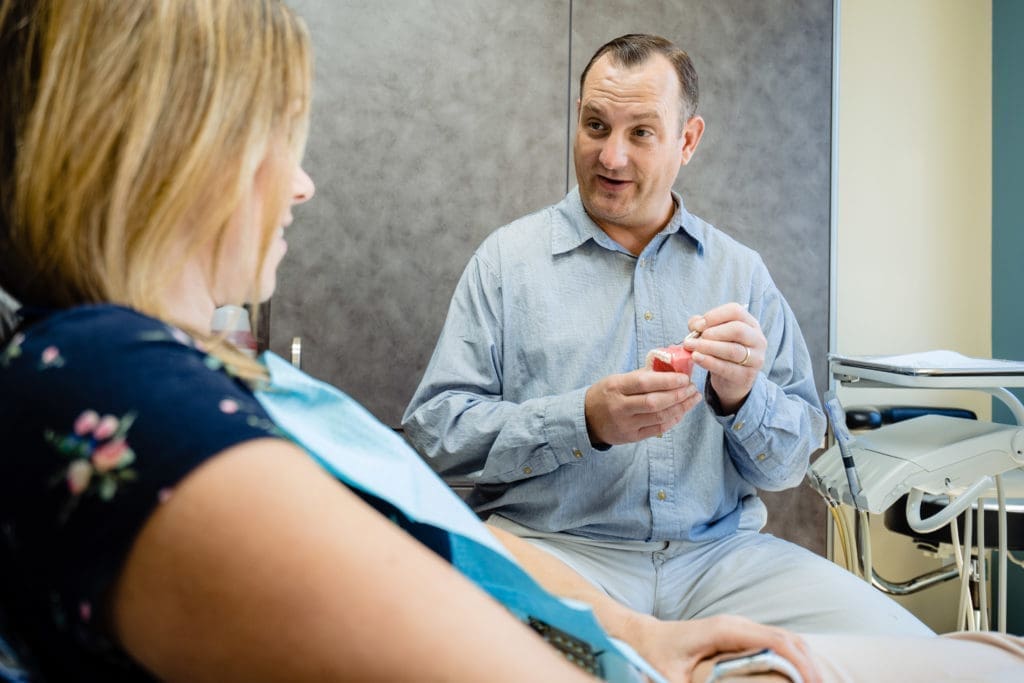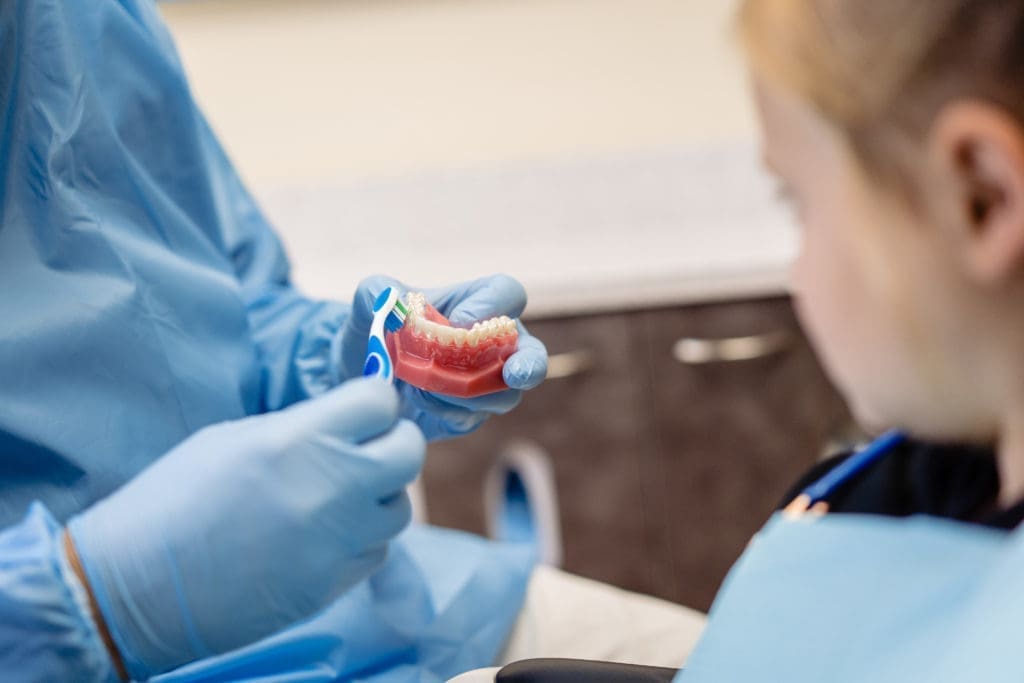
Dentures offer a traditional and effective solution for replacing missing teeth, helping individuals regain a functional bite and aesthetic smile. They cater to those who have lost several teeth or require a full set, providing both complete and partial options.
Made from materials that mimic the look of natural teeth and gums, dentures not only enhance appearance but also support facial structure and improve speech and chewing abilities. This makes them a valued option for many, highlighting the blend of cosmetic and practical benefits they bring to daily life.
Table of Contents
What are Dentures?
Dentures are designed not just for aesthetics but also to provide significant functional benefits. They help in the proper chewing of food, which is crucial for digestion, and in speaking clearly, enhancing overall quality of life.
The materials used for dentures have evolved, with options like acrylic resin, nylon, or metal bases, making them more durable and comfortable. Innovations have led to more natural-looking dentures that closely mimic the appearance of real teeth and gums.
Maintaining dentures is straightforward, involving regular cleaning, soaking overnight, and periodic adjustments. This care ensures they remain in good condition, fitting well, and functioning effectively for as long as possible.
Choosing dentures involves a consultation with a dental professional, who can recommend the best type based on individual needs and oral health. This personalized approach ensures that each person receives dentures that fit comfortably and look natural.
Types of Dentures (complete, partial, temporary)
Dentures are broadly categorized into three types: complete, partial, and temporary, each serving different needs. Each type has its specific use, ensuring that individuals can find a solution that best fits their situation.
Complete Dentures: These are designed for individuals who have lost all their teeth in one or both jaws. They rest directly on the gums and can be removed for cleaning. Complete dentures help in restoring the full functionality of the mouth, enabling normal eating and speaking habits.
Partial Dentures: Suitable for those who still retain some of their natural teeth, partial dentures fill in the spaces created by missing teeth and prevent other teeth from changing position. They are typically fastened to the natural teeth with clasps or precision attachments.
Temporary Dentures: Also known as immediate dentures, these are used right after tooth removal. While the gums and jaw are healing, temporary dentures allow a patient to have teeth during this period. They are usually replaced with permanent dentures once the healing process is complete.
Type of Materials used in Denture Making
Dentures are crafted from a variety of materials chosen for their durability, aesthetics, and comfort. Acrylic resin is widely used for the denture base because it adheres well to the base and resembles gum tissue. For the teeth, porcelain or acrylic resin are common choices, with porcelain offering a more natural look and acrylic being lighter and less expensive.
Metal frameworks are often used in partial dentures for additional support. Innovations in materials continue to improve the comfort, appearance, and functionality of dentures for wearers.
Advanced thermoplastics offer flexibility and a more natural appearance, appealing for those concerned with aesthetics. The development of flexible resin materials for partial dentures provides a comfortable, lightweight alternative that can adjust better to the contours of the mouth.

10 Factors that Affect Denture Longevity
Dentures offer a solution for missing teeth, but their lifespan varies widely. Understanding the factors that impact the longevity of dentures can help wearers maximize their use and maintain oral health.
Material Quality: The lifespan of dentures can significantly depend on the quality of materials from which they are made. Premium materials may offer enhanced durability and resistance to wear.
Proper Fit: A denture that fits well is less likely to incur damage since it distributes pressure more evenly during use.
Oral Hygiene: Maintaining good oral hygiene can prevent the buildup of harmful bacteria that might degrade denture materials.
Usage Habits: How the dentures are used, including the types of food consumed, can impact their wear and tear.
Storage Practices: Storing dentures correctly when not in use helps maintain their shape and integrity.
Regular Checkups: Frequent dental appointments allow for adjustments and minor repairs that can extend the life of dentures.
Gum and Bone Health: Changes in the mouth’s structure over time can affect how dentures fit and function, potentially shortening their lifespan.
Manufacturing Technique: The method and precision used in crafting the dentures can influence their durability.
Exposure to Stains and Chemicals: Certain foods, drinks, and chemicals can cause stains or damage to the dentures over time.
Personal Habits: Lifestyle choices, such as smoking or drinking, may affect the material condition of the dentures.
By understanding these factors, individuals can take proactive steps to ensure their dentures serve them well for as long as possible. Regular care, along with professional advice and intervention, plays a critical role in maximizing denture longevity.
6 Signs It's Time to Replace Your Dentures
Recognizing the signs that indicate it’s time for a replacement is key to maintaining your oral health and comfort.
- Poor Fit: Changes in your jaw and gums can make dentures loose, causing discomfort and difficulty eating or speaking.
- Visible Wear and Tear: If the teeth on the denture are worn down, it can affect your chewing and your jaw alignment.
- Frequent Breakages: Constantly needing to repair your dentures can be a sign that they’re past their prime.
- Irritation and Sores: Ill-fitting dentures can create persistent sore spots in your mouth.
- Staining and Odor: Over time, dentures can absorb stains and odors that are difficult to remove, affecting your breath and appearance.
- Change in Facial Structure: If your dentures no longer support your facial structure as they once did, it’s time for a new set.
Staying vigilant to these signs ensures that your dentures continue to serve their purpose effectively. Regular dental check-ups allow for timely replacements, keeping your smile at its best. If you notice any of these signs, consult your dentist to discuss your options for new dentures.
10 Common Questions asked by People about Dentures
How long can I expect my dentures to last?
Typically, dentures last between 5 to 10 years. Regular maintenance and adjustments can help ensure they remain functional and comfortable throughout this time.
What factors affect the lifespan of my dentures?
The lifespan of dentures is influenced by the quality of materials, the precision of fit, the wearer’s oral hygiene practices, and daily habits such as diet and whether they smoke.
How do I properly care for my dentures?
Proper care involves daily brushing, soaking overnight in a denture-cleaning solution to remove bacteria and stains, and handling them carefully to avoid damage.
When should I consider replacing my dentures?
Consider replacing your dentures if they become loose, cause irritation, or if you experience difficulty chewing, which can indicate wear or a change in fit.
Can the lifespan of dentures be extended with proper care?
Yes, through meticulous cleaning, regular dental check-ups, and avoiding practices that could damage them, the lifespan of dentures can be extended.
How often should dentures be professionally checked?
It’s recommended to have dentures checked by a professional at least once a year for adjustments, repairs, or to assess their condition.
What are the signs that my dentures need to be replaced?
Signs include discomfort, poor fit, difficulty eating or speaking, and visible wear or damage.
Does the material of the denture affect its durability?
Indeed, the durability of dentures can vary based on the material, with some materials offering greater strength and longevity than others.
How can I make my dentures last longer?
Maintain good oral hygiene, use appropriate cleaning methods, visit your dentist regularly, and avoid using dentures to bite hard substances.
What are the common issues with older dentures?
Common issues include loosening over time due to changes in the gum and bone structure, wear of the teeth, and staining.
Ready to Explore Your Options?
If you’re considering Dentures, Thomas Dentistry is here to guide you. Our team is dedicated to helping you achieve the smile you’ve always wanted, with a range of options tailored to your needs. We believe in providing personalized care that goes beyond just your teeth, focusing on your comfort and satisfaction.
Contact Thomas Dentistry to learn more about our dental services and how we can help you on your journey to a brighter, more confident smile. Schedule a consultation with us, and let’s explore the possibilities together.
